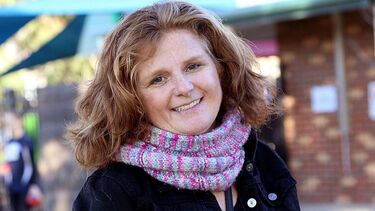
Polycystic ovary syndrome (PCOS) is a common hormonal condition that impacts the lives of one in 10 women in Australia. Lorna Berry is one of those women.
She was given her diagnosis at the age of 32 but only after a long and drawn-out medical journey. Her story will be familiar to so many other women who have had to wait years to receive proper care and treatment.
“Getting a diagnosis is like being given a key to the door,” she explains. “I was just so relieved.”
Getting a diagnosis is like being given a key to the door. I was just so relieved.”
From the beginning, Lorna felt she was different. She was bullied at school about her weight. In a 2-year period from ages 11 to 13, she gained 30 kilos.
Lorna is convinced her weight gain was the first marker of PCOS. However, it would take many years for the diagnosis to be made and by then she was experiencing some of the other features of the condition like irregular periods and excess facial hair.
“I remember going to the doctor and saying, ‘I’m really worried about my weight,’” she recalls. “And he told me, ‘You’re just one of those girls who has to starve herself’.”
The stigma and judgement around her weight was stinging. “People assume you are lazy and eat all the time.”
She was also given conflicting advice around her weight. “A female doctor in the same clinic told me I was fine as I was.”
Throughout her teens and 20s, there were other issues that bothered Lorna, including excess facial hair and highly irregular periods. “They are classic PCOS symptoms, but nothing was flagged,” she says.
“I’ve since learned that you must keep asking questions of the doctors and push the issue with them. My parents could probably have pushed a bit more too, but they were born in 1939 and always just accepted what the doctors said.”
I’ve since learned that you must keep asking questions of the doctors and push the issue with them.”
Married at 25, Lorna wanted a child but was concerned at the time it was taking to fall pregnant. She consulted a naturopath who provided some herbal treatment and, more importantly, assurance. “I felt supported then and I relaxed a bit,” she says.
A year later, the first of her 2 daughters was born.
Lorna’s symptoms persisted but when she read a story about PCOS, it was as if a light bulb had gone off. Suddenly she had a potential name for her experience.
Lorna again visited a doctor in the hope of receiving a diagnosis. “But he brushed me off,” she explains. “That happened a few times. Eventually I found a GP who sent me off for an ultrasound which revealed 32 follicles on one ovary and 28 on the other.”
Ultrasound to check for multiple immature follicles on the ovaries is one of the measures used to diagnose PCOS. Irregular or no periods, and high levels of male-type hormones called androgens are 2 other markers. High androgen levels may show up on blood tests or as symptoms such as excess hair growth and acne.
And just like that, Lorna was finally given a diagnosis.
Empowered by her newfound knowledge, Lorna began taking control of her health, learning everything she could about her condition. The level of misinformation around PCOS is alarming, she says. “It’s so important to get good, evidence-based information from reliable sources like Jean Hailes or the AskPCOS app.”
Now aged 54, she maintains a healthy lifestyle through diet and exercise. She has also built a strong network of other women with PCOS. The support they provide each other is hugely valuable.
Lorna has also become an advocate for other women with the condition through her work with the PCOS guideline committee for the Centre for Research Excellence in Women’s Health in Reproductive Life.
She believes it’s important for women and girls with PCOS to always feel supported, especially given the symptoms and stigma that can come with the condition.
Learn more about PCOS symptoms, causes, diagnosis and treatments. Plus, explore practical ways to improve your physical health and emotional wellbeing.
All reasonable steps have been taken to ensure the information created by Jean Hailes Foundation, and published on this website is accurate as at the time of its creation.
© 2025 Jean Hailes Foundation. All rights reserved. This publication may not be reproduced in whole or in part by any means without written permission of the copyright owner. Contact: licensing@jeanhailes.org.au